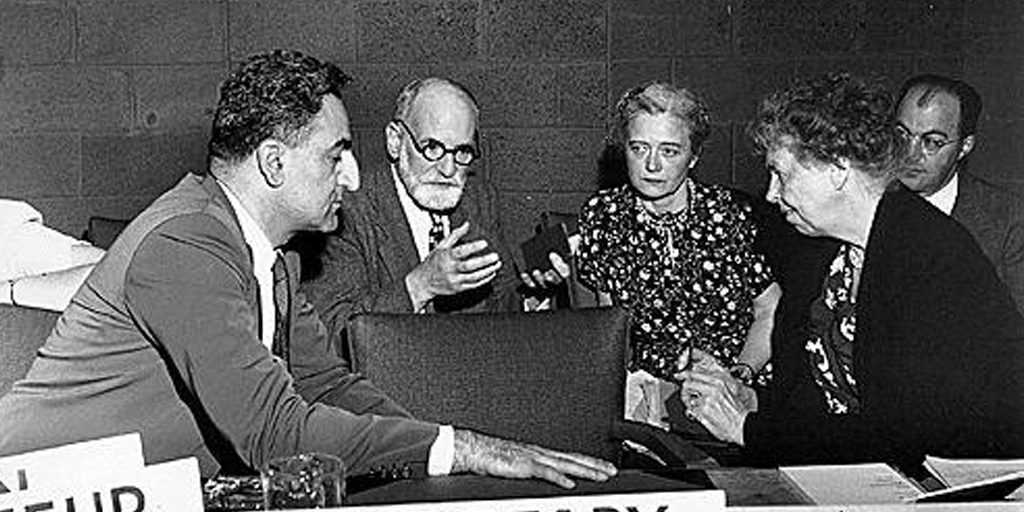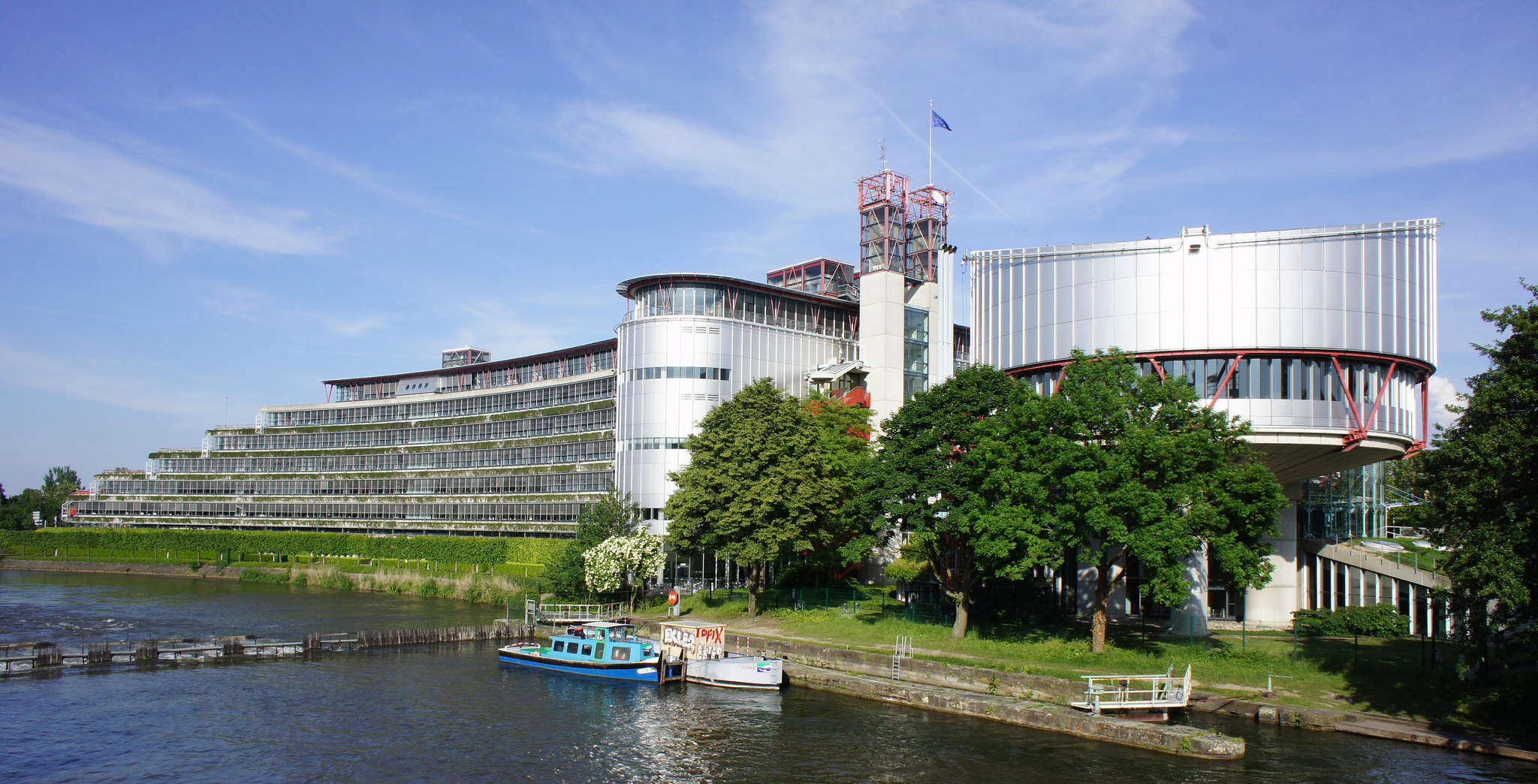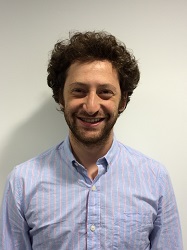In a French city, an iconic stainless steel and glass building mirrors the calm waters of a river, creating “a symbolic landmark but not a monument” which is “welcoming and humane, while preserving an appropriate dignity”. All is serene, except for the roar of traffic on the nearby dual carriageway.
The city is Strasbourg, the river the Ill, and the building the European Court of Human Rights. But this piece is about a dual carriageway. Sort of.
The road in question is the Allée René Cassin. The name is significant and, arguably, as iconic as the Court itself.
Who is René Cassin?
Embed from Getty Images
The Nobel Prize website names René Cassin as, “… the brains and the driving force behind the UN commission that drew up the Universal Declaration of Human Rights of 1948”.
The Universal Declaration of Human Rights (‘UDHR’) is a statement of fundamental rights, established by the United Nations. It’s not a treaty in itself, but defines the words “fundamental freedoms” and “human rights” in the United Nations Charter, which is binding on member states.
Taken together with two binding UN human rights covenants (the International Covenant on Civil and Political Rights (ICCPR) and the International Covenant on Economic, Social and Cultural Rights (ICESCR)), these documents make up the International Bill of Human Rights.
The name most closely associated with the UDHR is Eleanor Roosevelt, the US diplomat who chaired the drafting committee. But it was Cassin who actually put pen to paper and inked the first draft of one of the most important human rights documents of all time.
Why did Cassin care about human rights?
 In October 1914, Cassin was a soldier, gravely wounded by machine gun fire, and later awarded the Military Medal and Croix de Guerre. He used his experiences to advocate for the rights of others – in this case, disabled war veterans. He later became a lawyer. From 1924 to 1938 he was a French delegate at the League of Nations, arguing for disarmament and peaceful resolution of conflict.
In October 1914, Cassin was a soldier, gravely wounded by machine gun fire, and later awarded the Military Medal and Croix de Guerre. He used his experiences to advocate for the rights of others – in this case, disabled war veterans. He later became a lawyer. From 1924 to 1938 he was a French delegate at the League of Nations, arguing for disarmament and peaceful resolution of conflict.
Cassin is best known for his work on the UDHR. Its preamble states:
Disregard and contempt for human rights have resulted in barbarous acts which have outraged the conscience of mankind.
This has a particular poignancy when you consider the context and Cassin’s background. The UDHR was drawn up in the aftermath of the Second World War, by a world horrified by the Holocaust and determined that such atrocities should never again be allowed to happen. But for Cassin – though a distinguished lawyer – this was not just an academic matter. He was a French Jew who’d seen his sister Yvonne and 25 other members of his family deported from France and murdered by the Nazis.
Remarkably, as his biographers Jay Winter and Antoine Prost note, Cassin’s tragic experiences of Nazi atrocities did not dent his belief in the universality of rights: “For him, the rights of Jews were not specific rights; they were the rights of everyone”.
What did Cassin do for human rights beyond the UDHR?
Embed from Getty Images
Cassin fled German-occupied Paris in June 1940, arriving in London “without knowing what he would do there and without knowing a word of English”. His work there for the ‘Free French’ government-in-waiting earned him a death sentence from the collaborationist Vichy government in France.
From a human rights point of view, it was Cassin’s work for the London-based United Nations War Crimes Commission (‘UNWCC’) from 1943 that’s probably of most interest.
Hang on! 1943? You could be forgiven for questioning the chronology, since the UN dates from 24 October 1945, and war crimes were introduced during the Nuremberg Trials of 1945-49. But don’t worry – we haven’t time travelled – the UNWCC actually began work prior to the formal establishment of the UN itself.
Very little is known about the UNWCC. Its archives were closed in 1949 but have recently been re-opened to reveal a ground-breaking body that assisted in more than 30,000 cases, pursuing a wide range of offences such as rape, torture (including waterboarding), genocide and crimes against humanity.
Now, back to that dual carriageway…
Cassin later served as Vice-President (1959-1965) and President (1965-1968) of the European Court of Human Rights. Allée René Cassin is named after him, to recognise his important contribution to human rights advocacy.
On 10 October 1968 – the 20th anniversary of the adoption on the UDHR – Cassin was awarded the Nobel Peace Prize.
Cassin died on 20 February 1976, but he left the world (and human rights advocates in particular) an invaluable legacy: in the UDHR, in his promotion of human rights education, and in the work of the UK charity which bears his name.
On being informed of his Nobel Peace Prize, Cassin said: “I am very happy. It is not given to every man to have the luck to learn law, to teach it, to make it as a judge and promote it internationally as an international judge.” But he added: “I would be happier if there were a little more justice in the world.”







